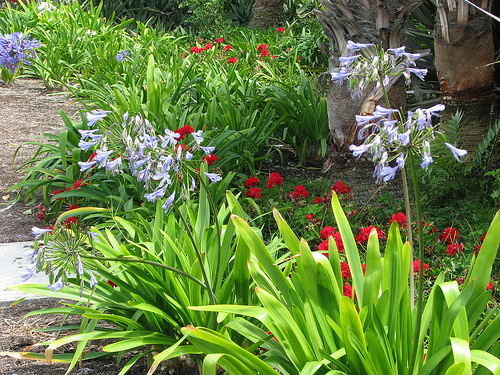100 Species Challenge: Lily of the Nile

2. Agapanthus, or Lily of the Nile
Also called African lilies, these lovely shrubs grow in our front yard and all over town. Their bloom season is just passing now, so the globes of purple or white blossoms at the top of each long stalk are looking a little bedraggled these days. But all summer long they were gorgeous. You see them often in median plantings and commercial landscaping, often intermingled with the earlier-blooming bird-of-paradise flowers (that’ll be a future entry).
3. Pelargonium
The red geraniums in the photo above give me a freebie for our challenge. Of course everybody knows what they are. Not that they are really geraniums—the correct name is pelargonium—but geranium is what everyone I’ve ever known has called them. On the east coast, we planted them as summer annuals or grew them in our windowsills. They’re still in my windows here, but they’re also in the ground, all over the place, sometimes in the form of huge bushes. I’ve adored them ever since Anne Shirley bestowed a kiss and a name (Bonny, of course!) on the red geranium blooming in Marilla’s kitchen.
This entry has been added to our main 100 Species Challenge page which contains our list-in-progress.



Jennifer says:
I love agapanthus. It’s one of my very most favorite blue flowers – like little floral fireworks.
On September 6, 2008 at 7:50 am
mamacrow says:
oh gosh THANKYOU you’ve answered two questions of mine! one – what is the flower the fills a front garden down the road from us, and two – what does agapanthus look like! (been reading the 5000mile Garden again).
I love the common name ‘lilly of the nile’ though somehow can’t imagine them in Eygpt. I’m so used to them in this front garden (been blooming there for at least 10years) that I kind of think of them as quintisentially english!
On September 6, 2008 at 12:04 pm
Karnak says:
Hi Melissa
Where I live in Australia, agapanthus is/was often used around homesteads because they are very drought hardy. They are a poor man’s flower found in some many gardens along with your beloved geraniums. I freely admit half my garden has such flowers or what my husband calls the raggedy cottage garden look. However they have been declared a weed as they tend to sow themselves and have escaped into the local bush land where like Pampas grass, Pines and other exotics they are not wanted. Arum lilies is another such weed but are’t weeds plants where they should not be.
On September 7, 2008 at 5:17 am
Ivy says:
I love agapanthus too. I bought some when I was up in the mountains (where it’s cooler), but they didn’t live too long in our garden (we live in a valley in the Philippines). I love using the common names too, like cherry pie for heliotrope or love-in-the-mist for nigella… Anyway, glad you’re better 🙂
On September 7, 2008 at 2:00 pm
Joanna-from-England says:
” ‘What is truth’ said Pilate
Waits for no answer
‘Double your stakes’ says the clock
To the aging dancer
‘Double your guard’ says Eternity
‘Treble the bars’
‘Holes in the sky’ says the child
Scanning the stars”
I agree that for the lover of truth discussion is always possible. For some people truth is relative; for others what they can persuade people to believe is true is true.
Absolute truth or perception of possession of absolute truth can lead to absolutism, so perhaps for your statement to be true there has to be an understanding that while absolute truth may be sought through discussion, discussion is unlikely to take place productively where there is a perception that one or both or all parties involved in the discussion possess either a perfect understanding of absolute truth or that a perfect understanding of absolute truth can be attained by fallible humans . . .
I enjoy reading your blog :)Glad you are feeling better.
On September 8, 2008 at 6:46 pm
Fe says:
Locally (Western Australia… although, given my mother is Victorian, possibly it’s the same there), Agapanthus are also known as Star-of-Bethlehem.
On September 15, 2008 at 8:23 am